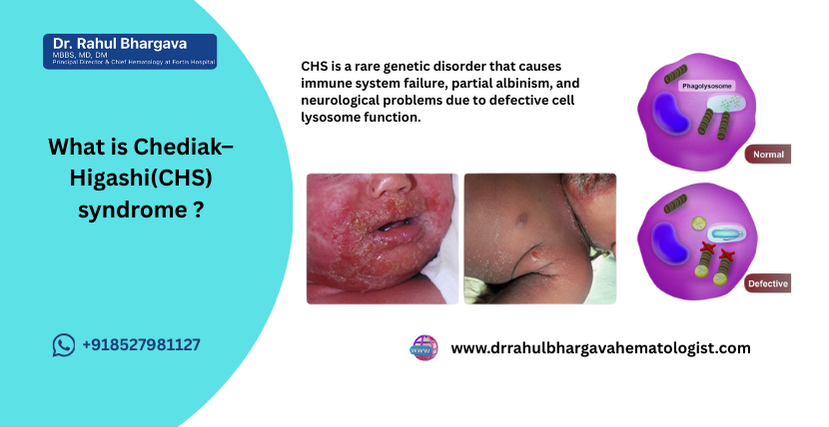Chediak–Higashi syndrome (CHS) Treatment in India

Chédiak–Higashi Syndrome (CHS) is a rare and serious genetic disorder that affects the immune system and leads to several health complications, including albinism, neurological problems, and a defective immune response. It is caused by mutations in the LYST gene (also known as CHS1), which encodes a protein involved in lysosomal trafficking in cells. This leads to defective lysosomes, which are crucial for breaking down and processing foreign substances, such as bacteria and dead cells, resulting in compromised immune function.
CHS affects several organ systems, including the immune system, nervous system, and skin, and is typically diagnosed in early childhood. The disease is inherited in an autosomal recessive pattern, meaning that both parents must carry the mutated gene for the child to be affected.
What is Chédiak–Higashi Syndrome?
Chédiak–Higashi Syndrome (CHS) is a rare, inherited disorder that affects multiple systems in the body, including the immune system, nervous system, and skin. The disease is primarily caused by mutations in the LYST gene, which leads to problems in the way cells transport materials. As a result, individuals with CHS often experience recurrent infections, neurological abnormalities, and light-colored skin and hair.
Causes of Chédiak–Higashi Syndrome
The primary cause of Chédiak–Higashi Syndrome is a genetic mutation in the LYST gene (also known as CHS1). This gene is responsible for the regulation of lysosome trafficking inside cells. A defect in this gene causes problems in cell function, particularly in white blood cells, which are crucial for immune defense.
Since CHS is an autosomal recessive disorder, a child must inherit two defective genes, one from each parent, to develop the syndrome.
Types of Chédiak–Higashi Syndrome
CHS can be categorized into two main types:
-
Classic or Childhood-Onset CHS: This is the most severe form, characterized by recurrent infections, albinism, and neurological issues. It often leads to life-threatening complications early in life.
-
Adult-Onset CHS: A rarer, milder form that presents fewer infections and neurological problems but can still lead to organ damage over time.
Symptoms of Chédiak–Higashi Syndrome
Individuals with CHS exhibit a range of symptoms that vary depending on the severity of the condition. Common symptoms include:
- Partial albinism: Pale skin, light-colored eyes, and silvery hair.
- Frequent bacterial infections: Especially respiratory and skin infections due to a weakened immune system.
- Bleeding issues: Easy bruising and prolonged bleeding from minor injuries.
- Neurological symptoms: Such as developmental delays, muscle weakness, seizures, and involuntary eye movements (nystagmus).
- Lymphoproliferative phase: Characterized by fever, enlargement of the liver and spleen, anemia, and a high risk of organ failure.
Diagnosis of Chédiak–Higashi Syndrome
Diagnosis of CHS typically involves:
- Genetic testing: Identifying mutations in the LYST gene is definitive for CHS diagnosis.
- Blood tests: A characteristic finding in CHS patients is the presence of giant granules in white blood cells under microscopic examination.
- Bone marrow biopsy: Helps assess the impact of CHS on blood cell production.
Early diagnosis is crucial for managing symptoms and preventing complications.
Treatment for Chédiak–Higashi Syndrome
While there is no definitive cure for CHS, treatment focuses on managing symptoms and preventing complications. The most common treatments include:
- Bone marrow or stem cell transplant: The only potential cure for the immune system issues associated with CHS. It is most effective when performed early in life.
- Antibiotics: Used to treat and prevent bacterial infections.
- Antiviral or antifungal therapy: May be necessary to combat opportunistic infections.
- Steroids or chemotherapy: In severe cases, they can help manage the lymphoproliferative phase.
- Gene therapy: Experimental at present but shows promise for future treatment options.
Cost of Treatment and Stay in India
The cost of treating Chédiak–Higashi Syndrome (CHS) in India is significantly lower compared to many Western countries, making it an attractive option for medical tourists. The total cost of treatment can vary based on the severity of the condition, the required interventions, and the duration of care. Here’s an overview of the costs:
-
Initial Consultation:
USD: $30 – $100
INR: ₹2,200 – ₹7,400 -
Genetic Testing (to identify LYST gene mutation):
USD: $100 – $500
INR: ₹7,400 – ₹37,000 -
Bone Marrow or Stem Cell Transplant:
USD: $15,000 – $40,000
INR: ₹12,00,000 – ₹32,00,000 -
Antibiotic and Antiviral/Antifungal Therapy (per month):
USD: $200 – $1,000
INR: ₹15,000 – ₹75,000 -
Hospital Stay (per night):
USD: $30 – $200
INR: ₹2,200 – ₹15,000 per night
India’s healthcare system provides high-quality treatment for CHS at a fraction of the cost in many Western nations. The affordability combined with the expertise of medical professionals makes India a preferred destination for CHS treatment.
Frequently Asked Questions
The survival rate varies depending on the timing of diagnosis and the availability of treatments like bone marrow transplants. Early treatment significantly improves outcomes.
Yes, prenatal genetic testing is available for families with a known history of CHS to detect the condition before birth.
No, CHS is not contagious. It is an inherited genetic disorder.